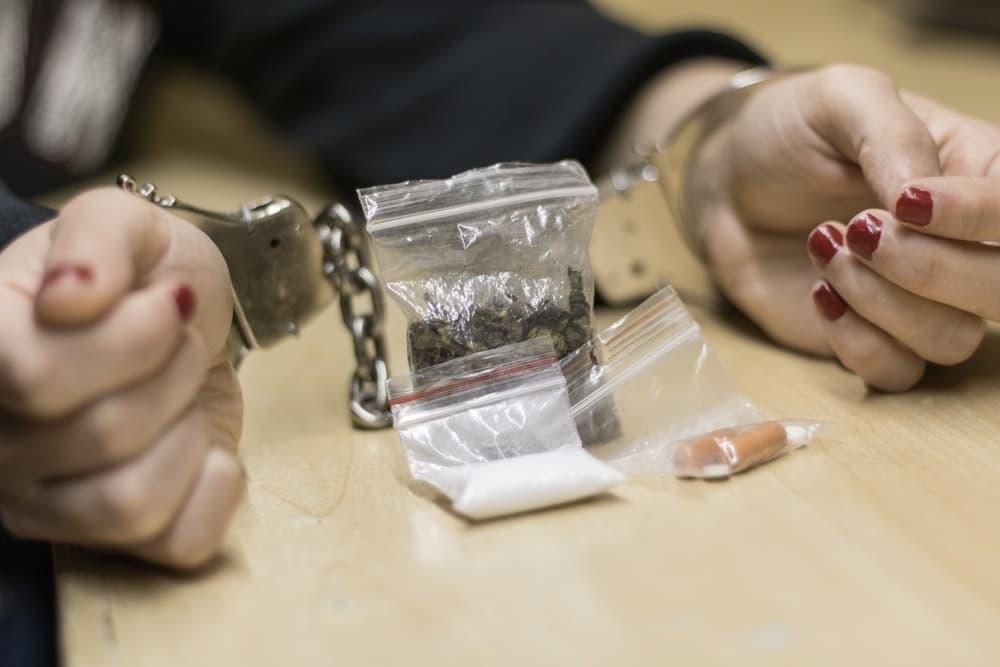Drug possession carries severe legal consequences that can dramatically damage your future. Whether you face charges or simply need to understand the risks, the following information details the potential penalties for drug possession across different categories and amounts.
The state takes drug offenses seriously, with consequences ranging from misdemeanors to felonies with long prison terms—so if you face drug possession charges, immediately call a drug crimes lawyer who can protect you.
Schedule Your Free Consultation
The Severity of Drug Laws

The DEA classifies controlled substances into six Schedules (I through VI), with Schedule I drugs considered the most dangerous. Their possession carries the harshest penalties.
Each category has specific consequences for simple possession and possession intending to sell or deliver. These classifications can mean the difference between a misdemeanor and a felony
Why Work With a Drug Crime Attorney?
To ensure you receive better results with your case, retain a drug crime attorney. They can review all the factors in your case to protect your rights and possibly reduce the charges.
Schedule I Drugs: The Most Serious Penalties
What Are Schedule I Drugs?
As noted, schedule I drugs include what the DEA deems the most addictive or dangerous. Schedule I drugs include LSD and heroin (at the top of the list), as well as peyote, psilocybin (also called magic mushrooms), and other hallucinogens. Methaqualone (quaaludes, PCP ), phencyclidine, and MDA round out the category.
Warning: Severe Consequences
Simple possession of any Schedule I drug is a felony offense, carrying up to five years in prison plus fines. If authorities catch you with intent to sell or deliver, the penalties increase – up to ten years in prison. No Schedule I drug offense is considered minor. All are serious crimes.
Schedule II Drugs: Prescription Medications and Cocaine

Schedule II represents the second-most addictive or dangerous substance.
Common Schedule II Substances
- Morphine
- Demerol
- Codeine
- Percodan
- Percocet
- Fentanyl
- Dilaudid
- Cocaine
- Amphetamines
Critical Threshold Amounts
The penalties for Schedule II drugs can quickly escalate from misdemeanors to felonies.
You face felony charges if you possess:
- More than four tablets/capsules of hydromorphone
- More than 100 tablets/capsules of other Schedule II substances
- One gram or more of cocaine
Warning: Possession vs. Intent
While simple possession might start as a misdemeanor (up to two years in prison and a $2,000 fine), crossing these thresholds jumps to a five-year felony. Intent to sell or deliver carries a ten-year maximum sentence.
Schedule III Substances: Prescription Risks
Schedule III drugs rank as the third most addictive substances and typically include drugs that people obtain illegally.
Common Schedule III Drugs
- Certain barbiturates
- Codeine-containing medicines (Fiorinal #3, Tylenol #3)
- Anabolic steroids
- Codeine-based cough suppressants
Schedule IV Drugs: Prescription Medications
The use of common medications under this category often happens when a regular prescription drug user develops an addiction to a medication. Below is a small list of the frequently used medications under this classification.
Including Common Medications
- Valium
- Librium
- Darvon
- Darvocet
- Other barbiturates and narcotics
Warning About Prescription Drugs
Even legally prescribed medications can lead to criminal charges if possessed without a valid prescription or in quantities exceeding prescribed amounts.
Schedule V Compounds: Lower Risk but Still Serious

Possession of these drugs often is not as serious as other types of possession; however, that doesn’t mean you won’t face some serious consequences.
Types of Schedule V Substances
These include compounds with limited amounts of:
- Codeine
- Dihydrocodeine
- Ethylmorphine
- Opium
- Atropine
Legal Consequences
While considered less dangerous, possession still carries up to six months in prison. Intent to sell or deliver jumps to a five-year felony, showing that even lesser controlled substances are taken seriously by law enforcement.
Marijuana and Schedule VI Substances: Don't Be Fooled
While some states allow the recreational use of marijuana, others, like North Carolina, ban the possession, cultivation, and sale of marijuana for recreational reasons, and the federal government maintains its prohibition.
Schedule VI Substance Include:
- Marijuana
- THC
- Hashish
- Hash Oil
Intent to Sell Carries Severe Penalties
Possession with intent to sell has dramatically increased penalties in some states and can carry penalties of prison time and hefty fines based on weight.
Drug Paraphernalia: Additional Risks

Possessing drug paraphernalia also results in punishments in some states.
What Constitutes Paraphernalia?
Any equipment, products, or materials used to:
- Manufacture drugs
- Store drugs
- Use drugs
- Conceal drugs
Legal Consequences
- Basic possession: Up to 120 days in prison
- Delivering to minors: One year in prison (felony)
- Advertising paraphernalia: Up to 60 days in prison
Long-Term Consequences Beyond Prison - Get in Touch With a Drug Crime Attorney Right Away
Having a drug possession charge and conviction carries long-term repercussions. That is why you need to count on the services of a drug crime lawyer if you’re facing this type of charge.
Criminal Record
A drug conviction can:
- Create a permanent criminal record
- Impact employment opportunities
- Affect housing applications
- Limit educational opportunities
- Restrict professional licensing
Additional Penalties
Other penalties, besides those mentioned, include:
- Driver's license suspension
- Asset forfeiture
- Mandatory drug treatment
- Probation requirements
- Court costs and fines
Protecting Yourself: Important Warnings - Get Help From an Attorney
A drug crime attorney can direct you so you are aware of your rights and will avoid problems with self-incrimination as well as an unlawful search and seizure. They’ll review all the factors of your case so you have more control over what happens in a drug possession case.
Know Your Rights
- Never consent to searches without a warrant
- Exercise your right to remain silent - striking a balance between defending your position and having legal representation during an interrogation
- Request a skilled criminal defense lawyer immediately if arrested
- Don't discuss charges with anyone except your attorney
Seek Help
If you struggle with substance use:
- Contact addiction specialists
- Seek treatment programs
- Consider rehabilitation options
- Join support group
Talk to a Drug Crime Attorney Now - Not Later
If you're facing drug charges, having proper legal guidance can mean the difference between a misdemeanor and a felony and between months and years of incarceration. Consult a Carteret County criminal defense attorney now.